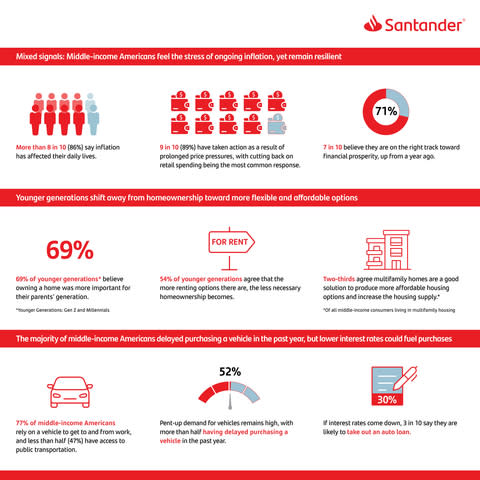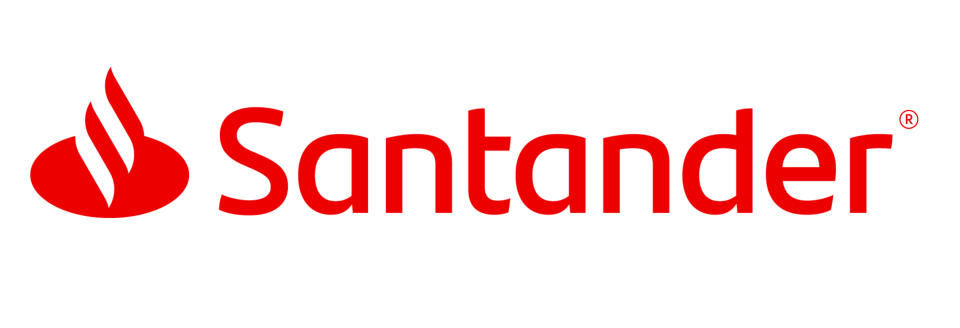Middle-Income Consumers Remain Confident Amidst Price Pressures, Santander US Survey Finds


81% consider inflation a major concern, the highest level over the past year.
Most middle-income households have remained current on their bills, though more are making spending cuts to manage higher prices.
Gen Z and millennials have shifted their mindset around homeownership and find flexibility in renting, with 6 in 10 believing homeownership as a sign of financial prosperity is outdated.
Federal Reserve rate cuts could unlock pent-up vehicle demand, with 52% delaying a vehicle purchase over the last year.
BOSTON, October 08, 2024--(BUSINESS WIRE)--Santander Holdings USA, Inc. ("Santander US") today announced new findings from a survey that shows while middle-income Americans remain optimistic about their financial futures, they continue to navigate inflationary pressures and recession concerns. More consumers (81%) consider inflation a major concern in Q3, and 86% say it has impacted their daily lives. Despite this trend, consumers remain resilient. Most middle-income Americans (76%) say they have remained current on their bills, and more of them (71%) say they are on the right track toward financial prosperity than a year ago.
When it comes to their economic outlook and the possibility of a recession, consumers are sending mixed signals. While economic indicators suggest the economy is stable, a majority of middle-income Americans remain uncertain. More than six in 10 (62%) believe the United States is headed toward a recession in the next year, though this is down from 2023 highs. At the same time, some see potential for a soft landing, as two-thirds do not believe a recession is likely to occur in the next three months.
Amidst concerns about inflation and economic uncertainty, middle-income Americans are adapting to conditions. Most (89%) say they have taken some action, such as scaling back on retail spending, due to inflation. Additionally, less than one in four (22%) are feeling insecure about their finances, down four percentage points from a year ago.
"Consumers continue to take actions to manage their finances and navigate economic stressors," said Tim Wennes, CEO of Santander US. "Their ability to make necessary budget decisions to remain current on their bills and manage the overall economic uncertainty over the past few years has helped to boost their confidence. Looking ahead, I expect to see these behavioral changes lead to fundamental shifts in consumers’ financial priorities."
The survey identified a change in mindset around homeownership, which is falling in importance as consumers seek out flexibility and affordability, especially among younger generations. Seven in 10 Gen Z and millennials say owning a home was more important for their parents’ generation. Meanwhile, vehicle access remains a top priority. The majority (85%) say vehicle access gives them more flexibility in where they live. More than half (52%) delayed purchasing a vehicle in the past year due to cost, though lower interest rates on financing options could help fuel more auto purchases.
While many households continue to feel the effects of inflation, few consumers have taken advantage of the higher rates available on savings through a high-yield savings account or certificate of deposit (CD). Six in 10 households have not yet moved their savings to earn a higher rate of interest, and 24% are unaware of the interest rate they currently earn. However, ongoing rate cuts could prompt consumer action. Nearly half (47%) of middle-income Americans say they are likely to open a CD to lock in a higher interest rate as rates decline.
"Many consumers hold misperceptions about opening high-yield savings accounts, including that they are too difficult to open or aren’t worth the effort," said Wennes. "Many consumers could be putting their hard-earned savings to work for them by opening a high-yield savings account, which can now take only a matter of minutes. At Santander, we are working on introducing a new, national digital offering that will reduce the friction to create a fast onboarding experience and make it easier for customers to take advantage of higher rates."
The study, which built upon previous research, assessed middle-income Americans’ current financial state and future aspirations, with a focus on how current economic conditions have impacted their households. It also explored their financial relationships with drivers of prosperity.
Homeownership vs. Renting
Middle-income Americans’ perspective on homeownership has shifted, with many now valuing renting as an option. This is especially true among younger generations. Six in 10 Gen Zers and millennials believe homeownership as a sign of financial prosperity is an outdated concept, and more than half (54%) agree that the more renting options there are, the less necessary homeownership becomes. Even among younger homeowners, 46% say owning a home is more trouble than it is worth and miss the financial flexibility of renting.
While many renters cite benefits such as flexibility to pursue employment opportunities and access to more amenities, 60% of them also believe renting is more affordable than having a mortgage, and nearly half (48%) would be comfortable renting forever. Multifamily housing – defined as properties with five or more residential units – have proven to be cost-effective options for many middle-income consumers. Of those residing in a multifamily unit, 66% agree they are a good solution to produce more affordable housing options and increase the housing supply.
Vehicle Access Critical for Consumers
Middle-income Americans continue to rely on vehicle access. The majority (84%) say it provides them with greater flexibility in how they live their lives, and 77% depend on a vehicle to get to work. While more than half (52%) have delayed purchasing a new vehicle in the past year due to cost, more than four in 10 are considering purchasing a new one in the coming 12 months. If interest rates come down in response to rate cuts by the Federal Reserve, 30% say they are likely to take out an auto loan. Meanwhile, vehicle affordability is important to consumers as they continue to contend with everyday price pressures. Most (80%) say fuel efficiency is important, and 60% prioritize vehicle cost over size/space.
This research on financial prosperity, conducted by Morning Consult on behalf of Santander US, surveyed 2,202 Americans who are bank and/or financial services customers, ages 18-76. Survey participants are employed or looking for work, own/use at least one financial product and are the primary or shared decision-maker on household finances with household income in the "middle-income" range of ~$50,000 to $148,000. This Q3 study was conducted in August 2024. The interviews were conducted online, and the margin of error is +/- 2 percentage points for the total audience at a 95% confidence level. Percentages may not total 100 due to rounding. The data was weighted to target population proportions for a representative sample based on age, gender, ethnicity, region, and education.
The full report and more information about the Santander US survey is available here.
About Santander US
Santander Holdings USA, Inc. (SHUSA) is a wholly-owned subsidiary of Madrid-based Banco Santander, S.A. (NYSE: SAN) (Santander), recognized as one of the world’s most admired companies by Fortune Magazine in 2024, with approximately 168 million customers in the U.S., Europe and Latin America. As the intermediate holding company for Santander’s U.S. businesses, SHUSA is the parent company of financial companies with more than 11,800 employees, 4.5 million customers, and assets of over $165 billion for the fiscal year ended 2023. These include Santander Bank, N.A., Santander Consumer USA Holdings Inc., Banco Santander International, Santander Securities LLC, Santander US Capital Markets LLC and several other subsidiaries. Santander US is recognized as a top 10 auto lender and a top 10 multifamily bank lender, and has a growing wealth management business. For more information about Santander US, please visit www.santanderus.com.
Santander Bank, N.A. is a Member FDIC and a wholly owned subsidiary of Banco Santander, S.A. © 2024 Santander Bank, N.A. All rights reserved. Santander, Santander Bank, and the Flame Logo are trademarks of Banco Santander, S.A. or its subsidiaries in the United States or other countries. All other trademarks are the property of their respective owners.
View source version on businesswire.com: https://www.businesswire.com/news/home/20241008356038/en/
Contacts
Media:
Andrew Simonelli
andrew.simonelli@santander.us
Caroline Connolly
caroline.connolly@santander.us